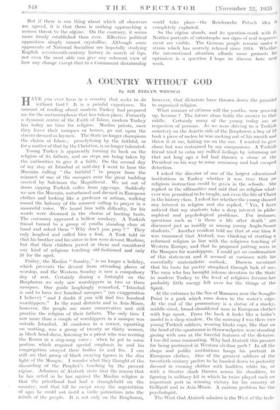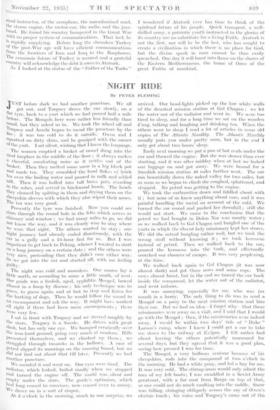A COUNTRY WITHOUT GOD
By SIR EVELYN WRENCH
HAVE you ever been in a country that seeks to do without. God ? It is a painful experience. No amount of reading about modern Turkey had prepared me for the metamorphosis that has taken place. Formerly a dynamic centre of the Faith of Islam, modern Turkey has today no time for religion. Muslim priests, once they leave their mosques or homes, go out upon the streets dressed as laymen. The State no longer champions the claims of Islam ; proselytising by the faithful, or for a matter of that by the Christian, is no longer tolerated.
Young Turkey is apparently turning its back on the religion of its fathers, and no steps are being taken by the authorities to give it a faith. On the second day of my stay at Istanbul at mid-day I went to hear the Muezzin calling "the faithful " to prayer from the minaret of one of the mosques near the great building erected by Suleiman the Magnificent. We sat out of doors sipping .Turkish coffee from egg-cups. Suddenly we saw the Mueizin, unturbaned and dressed in European clothes and looking like a gardener or artisan, walking round the balcony of the minaret calling to prayer in a mournful voice. We heard him with difficulty, for his words were drowned in the chorus of hooting taxis. The ceremony appeared a hollow mockery. A Turkish friend turned to a group of youths standing close at hand and asked them ," Why don't you pray ? They only laughed and called him a :fool. A Turk told us that his brother and his sister-in-law were devout Muslims, but that their children jeered at them and considered any kind of religious teaching old-fashioned and only fit for the aged.
Friday, the Muslim " Sunday," is no longer a holiday, which prevents the devout from attending places of worship, and the Western Sunday is now a compulsory day of rest. Certainly during a fortnight on the Bosphorus we only saw worshippers in two or three mosques. Our guide laughingly remarked, "Istanbul is said to have five hundred mosques " (an exaggeration I believe) " and I doubt if you will find five hundred worshippers." In the rural districts and in Asia-Minor, however, the people are more conservative and . still practise the religion of their fathers. The only time I saw more than a couple of worshippers in a mosque was outside Istanbul. At .sundown in a corner, squatting on matting, was a group of twenty or thirty women, in black head-dress, listening to a priest who was reciting the Koran in a sing-song voice ; when he got to some portion which required special emphasis he and his congregation swayed their bodies to and fro. I can still see that group of black swaying figures in the dim light of the Mosque. I wonder what they thought of the discarding of the Prophet's teaching by the present regime. Admirers of Ataturk state that the reason that he has acted as he has against the Muslim religion is that the priesthood • had had a stranglehold on the country, and that till he swept away the superstition of ages he could not instil a virile patriotism into the minds of the people. It is not only on the Bosphorus,, however, that dictators have thrown down the gauntlet to organised religion.
What manner of citizens will the youths, now growing up, become ?. The future alone holds the answer to that riddle. Certainly many of the young today are no respecters of persons. As we were driving to a Turkish cerhetery on the Asiatic side of the Bosphorus a boy of 12 took a piece of melon he was sucking out of his mouth and threw it at me, hitting me on, the ear. I wanted- to give chase but was restrained by my companions. A Turkish friend tried to calm my ruffled feelings by informing me that not long ago a lad had thrown a stone at the President on his way to some ceremony and had escaped detection.
I• asked the director of one of the largest educational institutions in Turkey whether it was true, that no religious instruction could be given in tic schools. She replied in the affirmative and said that no religion what- ever was permitted to be taught, not even the life of Christ in the history class. I asked her whether the young showed any interest in religion and she replied, " Yes, I have noticed that my students take a deep interest in philo- sophical and psychological problems. For . instance, questions such as ' is there a life after death ' .,axe discussed just as readily as among young Anglo-Saxon students." Another resident told me that at one time it was rumoured that Ataturk was thinking of starting a reformed religion in line with the religious .teaching of Western Europe, and that he proposed putting seats in the Mosques for worshippers. I could get no confirmation of this statement and it seemed at variance with his essentially materialistic outlook. Darwin mentions that his taste for poetry atrophied through lack of use. The man who has brought intense devotion to the State in modern Turkey to the level of religious fervour has • probably little energy left over for the things of the Spirit.
At the entrance.to the Sea of Marmora near the Seraglio , Point is a park which runs down to the water's - edges At the end of the promontory is a statue of a stocky, • middle-sized, broad-shouldered man in European clothes with legs apart. From the back it looks like a tailor's model in a shop window. On the morning I was there two young Turkish soldiers, wearing khaki caps, like that on the head of the sportsman in Struwwelpeter,, were standing gazing with awe at the forceful features of the dictator. I too did some ruminating. Why had Ataturk this passion for being portrayed in Western civilian garb ? In all the shops • and • public institutions hangs his portrait in European clothes. One of the greatest soldiers of the twentieth century prefers to be handed down to posterity dressed in evening clothes with faultless white tie, or with a theatre cloak thrown across his shoulders, to figuring in military -kit in which he twice played, such an important part in winning Victory for his country • fit' Gallipoli and in Asia-11Iinor. A curious problem for the.. psychologist.
The West that Ataturk admires is the West of the tech- meal instructor, of the aeroplane, the macadamised road, the steam engine, the motor-car, the radio, and the jazz- baud. found his country hampered in the Great War With riO proper system of communications. That lack he is rapidly supplying. Before long the shrunken Turkey of the 'Post-War age will have efficient communications from .the frontiers of Iran and Iraq to the Bosphorus. `The economic future of Turkey is assured and a grateful country will acknowledge the debt it owes to Ataturk. As I looked at the statue of the "Father of the Turks " I wondered if Ataturk ever has time to think of the spiritual future of his people. ,Quick transport, a well- drilled army, a patriotic youth instructed in the glories of its country are no substitute for a living Faith. Ataturk is not the. first., nor will he be the last, who has sought to create a civilisation in which there is no place for God, but the divine spark in man cannot ,be thus easily quenched. One day it will burst into flame on the shores of the Eastern Mediterranean, the home of three of the great Faiths of mankind.































































































 Previous page
Previous page